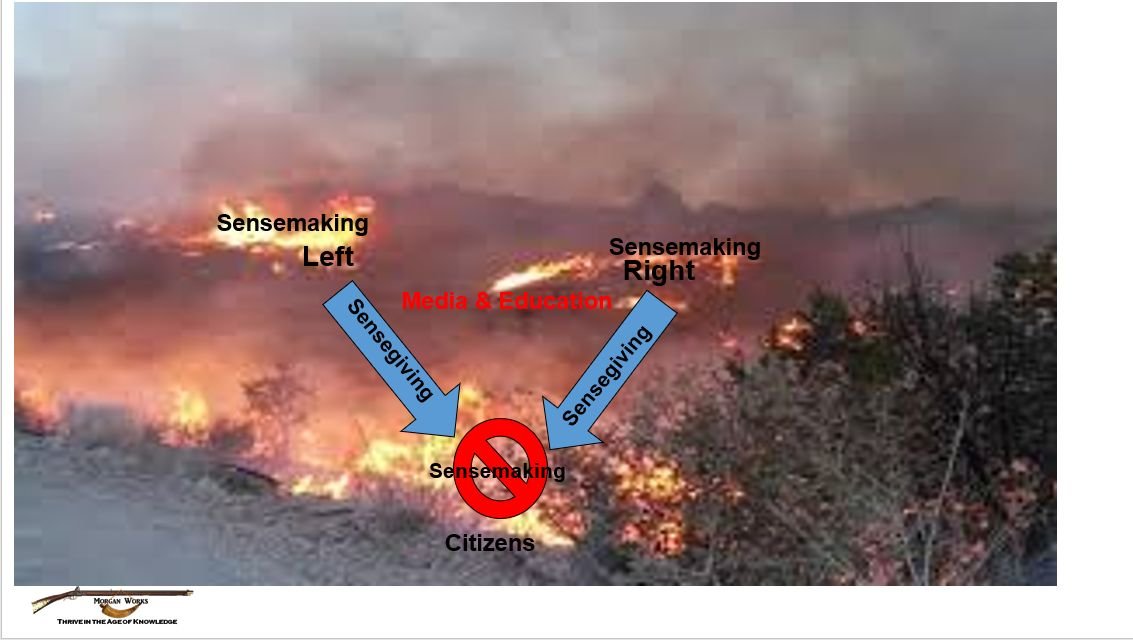
Part 1-Citizen Resiliency in a Republic
Truth Is the First Casualty in War
“God is not averse to deceit in a just cause.” Aeschylus
“Truth is not the first casualty of war alone: it is the first casualty of populism “ Theodore Dalrymple
“Truth is the first victim to fear and policy.” Anne MacVicar Grant in Memoirs of an American Lady.
Abstract: Key U.S. Institutions fail to education and inform the American electorate. A well-informed and educated electorate is vital to a republic
A republic requires an educated and informed electorate. Without this electorate, citizens may elect representatives that promise them the world, but deliver very little. These representatives may have the political skills to get elected, but lack the cognitive capability and capacity or the willingness to effectively legislate, govern, and judge.
This seven-part series will outline the core problem with institutions—particularly education and the media—then build a solution to address the impact of our broken institutions. This series does not address how to fix these broken institutions but focuses on how the electorate can get the skills and information it needs to assess the truth and make informed decisions.
The figure above uses the terms “sensemaking” and “sensegiving”. These are sociologist terms that roughly correspond to gaining situational awareness and communicating it. However, they increasingly have taken on the meaning to determine your own version of the truth and bombard everyone with it to convert them to your viewpoint. Karl Weick, in The Collapse of Sensemaking in Organizations: The Mann Gulch Disaster, popularized these terms during his analysis of the Mann Gulch fire in 1949, where 13 smokejumpers died. There were two blazes on ridges in the fire area. These correspond to the sensemaking and sensegiving of the left and the right of the political divide.
The series will return to Mann Gulch, but for the moment, now look at the text box above. There is a well-worn quote about truth being the first casualty of war. Like many famous quotes, the original source is shrouded in the mists of time. The three quotes below are variants on a common theme. The quote ascribed to Aeschylus is the oldest and sometimes thought the origin of the statement that truth is the first casualty of war.
If we look at all three quotes though, the root issue is, as Aeschylus notes, using deceit to further your own ends. Often when a group undertakes what they see as a virtuous cause, they can fall into “the end justifies the means”. The cause is so righteous that interim deceit is fine. Truth becomes fungible. Sometimes, the party engages in outright deceit and in others, it is their understood version of the truth. There is perhaps a spectrum that ranges from a naïve interpretation of a situation, through biased interpretation (see Part 3a of my series on Judgment and Policies) to deceit.
As people construct the truth, it could fall anywhere on this spectrum. What they all do, though, is engage in sensemaking. Wieck had this to say about sensemaking,
“The basic idea of sensemaking is that reality is an ongoing accomplishment that emerges from efforts to create order and make retrospective sense of what occurs.”
Foldy, Goldman, and Ospina (2008) in Sensegiving and the role of cognitive shifts in the work of leadership define sensegiving as “shaping how people understand themselves, their work, and others engaged in that work—is critical to the work of organizational leadership.” They then define the term, “cognitive shift” as “a change in how an organizational audience understands an important element of the organization’s work, as a desired outcome of the sensegiving process.” (p. 514).
We see this in the concept of Rhetorical History, where organizations reconstruct history to meet their desired future identity. Even fact-based recollection can, and often is, influenced and shaped by bias. The more someone is influenced by a just cause and feels the end justifies the means, the more their sensemaking can become something designed to drive and shape other people’s sensemaking through aggressive sensegiving.
When the organizations doing the sensemaking also control the organizations that transmit the sensegiving, then they inundate the targets with a synchronized campaign to create a cognitive shift. Citizens need effective education that teaches critical thinking and analytical skills understand and assess the intended cognitive shift. Unfortunately, when citizens perhaps need it more than any other time in our history, the education institution fails to deliver an effective education (part 3).
What happens when the citizens feel they can no longer trust the media for honest reporting? Joseph Goebbels said, “If you tell a lie big enough and keep repeating it, people will eventually come to believe it.” This is happening on both sides of the media divide and many Americans have lost or are losing trust in any media reporting or are simply ready to believe anything. In July 2021, Gallup polling reports that only Congress has a lower trust rating than the media. Reuters reports that Americans have the lowest trust rating of the media than any of the 46 countries surveyed.
Now let’s go back to Goebbels. Many people have heard the quote above. But what he says in the same paragraph is even more interesting:
“The lie can be maintained only for such time as the State can shield the people from the political, economic and/or military consequences of the lie. It thus becomes vitally important for the State to use all of its powers to repress dissent, for the truth is the mortal enemy of the lie, and thus by extension, the truth is the greatest enemy of the State.”
What do we see now with Critical Racial Theory and the suppression of academic freedom at our colleges and universities, as well as K-12 schools? There is a lot of concern over government efforts to circumscribe the 2nd Amendment, but perhaps the critical issue is efforts to circumscribe the 1st Amendment. And it is not the first time in American history. During the John Adams administration, Congress passed The Alien and Sedition Acts in 1798. This effectively gave the President the right to suppress free speech if he deemed it dangerous to the government. When Jefferson was inaugurated as President, he immediately worked to repeal these acts. During his first inaugural address, he stated:
“All, too, will bear in mind this sacred principle, that though the will of the majority is in all cases to prevail, that will to be rightful must be reasonable; that the minority possess their equal rights, which equal law must protect, and to violate would be oppression. Let us, then, fellow-citizens, unite with one heart and one mind. Let us restore to social intercourse that harmony and affection without which liberty and even life itself are but dreary things. And let us reflect that, having banished from our land that religious intolerance under which mankind so long bled and suffered, we have yet gained little if we countenance a political intolerance as despotic, as wicked, and capable of as bitter and bloody persecutions.”
The institutions that the citizens need are failing to build critical thinking skills and to objectively inform. Well, if the goal is to indoctrinate specific forms of sensemaking, then perhaps they are succeeding.
Puppet Masters confuse reason and try to muddle knowledge and even the strict definition of information to use data to sway opinion and to shape the electorate and, hence, the government. Therefore, Puppet Masters work against forms of education that teach knowledge and strives to ensure they base educational systems on data and teaching “facts” geared to the designed cognitive shift. They teach what to think rather than how to think. They exploit the methods of Industrial Era education to instill their messages and indoctrinate their students.
Series Flow
Part 1: Introduction
Part 2-Lessons of Mann Gulch: Institution Failures and Limits of Sensegiving
Part 3—The Failure of the Educational Institution: Siloes, Stovepipes, Stovepipes and Indoctrination
Part 4—The Failure of the Media Institution: Yellow Journalism and Sensegiving Masquerading as Factual Reporting
Part 5—Cutting the Puppet Masters’ Strings
Part 6—Developing Resilience
Part 7—Center for Citizen Resiliency





